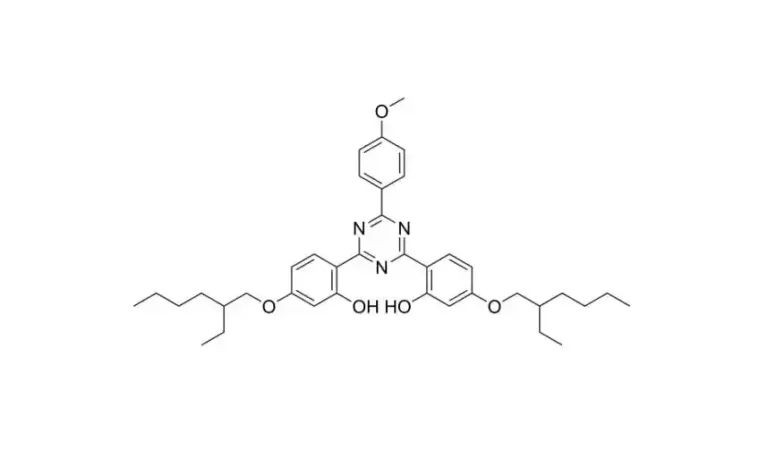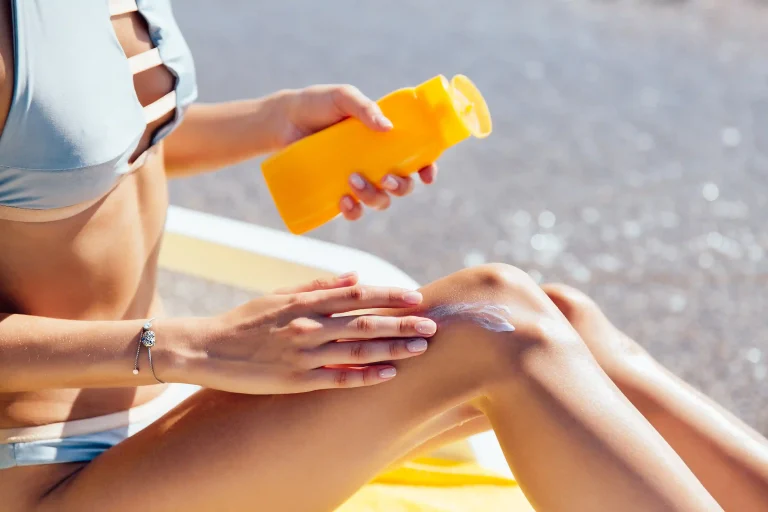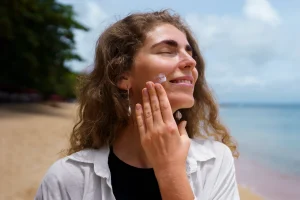Selecting the sunscreen can feel overwhelming when you’re presented with a lengthy roster of components that might seem unfamiliar to you. Understanding the substances you’re applying to your skin is crucial. This article can help you make a better choice.
What Are the Harmful Ingredients in Sunscreen?
There are numerous sunscreens available in blocking UV rays; however, they may carry potential health and environmental risks that should not be overlooked . Thus it is imperative to comprehend which components could raise concerns and the reasons, behind them.
Oxybenzone
Many people use oxybenzone as a UV filter; however, it remains a contentious topic in the skincare world. This substance easily seeps into your skin. It has been identified as a disruptor of the hormonal system potentially causing harm. It’s advisable to be mindful when choosing sunscreens with oxybenzone for kids and expectant mothers.
Retinyl Palmitate
Retinyl palmitate is a type of Vitamin A that is occasionally included in sunscreens for its aging properties; although it can deteriorate and generate damaging free radicals that may speed up skin aging and cause potential cancer risks. Be sure to inspect the ingredients in your sunscreen and avoid those with retinyl palmitate if you anticipate direct sunlight exposure.
How Do These Ingredients Affect Your Health?
Some ingredients in sunscreens can become a danger to your health and well-being.
Hormonal Disruption
Some chemical UV filters like oxybenzone can disrupt the endocrine system in our bodies by affecting hormone levels and possibly causing health problems such as issues with reproduction and thyroid function, among other essential bodily functions that are worth noting when checking product labels.
Allergic Reactions and Skin Sensitivity
Many components within sunscreens will cause skin sensitivity. Certain chemical sunscreens, such as oxybenzone, are well-known allergens which, in many people, can cause redness, itchiness, or rashes. So choose one which best suits your skin type and do a patch test prior to the final application.
Are There Safer Alternatives Available?
Thankfully, some of the options currently available in the market have fewer health and environmental concerns when bought. That would mean that the consumers have to be educated on the different types of sun protection available.
Mineral-Based Sunscreens
Mineral sunscreens are often viewed as an option compared to chemical sunscreens because they contain zinc oxide or titanium dioxide that forms a protective layer on the skin to deflect UV rays rather than soak them in like chemicals do which can lead to skin irritation and allergies.
Whitening Powders
Whitening powders are frequently added to beauty and sunscreen products to enhance and balance skin tone often using mineral components, like titanium dioxide.
The way they function is by utilizing light scattering and reflective characteristics to enhance the brightness of the skin while diminishing the appearance of spots and flaws.
They are considered safe because when they come from minerals such as titanium dioxide and are made with coatings, in their formulation process they are unlikely to cause skin irritation or be absorbed into the body extensively.
UV Absorbers
UV filters are substances created to soak up and scatter UV rays effectively utilized in sunscreens and other products for UV protection purposes.
How they operate is by absorbing UV rays to shield the skin from harm and prevent damage caused by them.
Some individuals exhibit a sense of hesitation due to the fact that certain UV absorbers are artificial and raise comparable worries to those associated with natural UV filters.
Natural Ingredients to Consider
Natural elements are becoming more favored in sun protection alongside mineral-based sunscreens nowadays. These components encompass plant-derived oils and extracts that possess antioxidants and innate sun-shielding qualities; they are generally gentler and less likely to trigger skin reactions or health issues compared to UV filters. Though not as potent as UV blockers, these natural ingredients provide a gentle and health-conscious approach, to safeguarding against the sun’s rays. It could be worthwhile to consider incorporating some of these elements when selecting products.
How Can You Choose the Right Sunscreen?
Choosing sunscreen goes beyond simply grabbing a product from the store shelf; you have to interpret labels and comprehend the components you’re putting on your skin. It can feel daunting to grasp all the chemicals in the products; hence it’s important to proceed with care and vigilance.
Why Choose BFP as Your Trusted Supplier for Sunscreen Ingredients
At BFP, a company specializing in sun protection products that combat aging effects, offers a range of items such as natural UV blockers and skin-lightening powders. At BFP they are dedicated to offering top-notch products to meet your sun protection requirements and preferences! Feel free to check out the sun protection solutions provided by BFP that might suit your needs!
Frequently Asked Questions
What is the difference between mineral and chemical sunscreens?
Physical sunscreens rely on mineral ingredients, including zinc oxide and titanium dioxide, that work by physically creating a shield of sorts to deflect UV rays back. Chemical sunscreens depend upon chemical filters to absorb UV rays instead. Mineral-based sunscreens are much safer and more skin-friendly than chemical sunscreens, which can pose a certain health and environmental risk.
Can sunscreen ingredients harm marine life?
Certain ingredients in chemical sunscreens, such as oxybenzone, have also been shown to destroy reefs and marine life, once they are washed off your body into the ocean waters, causing fragile ecosystems to die. The better option is going for mineral-based sunscreens as a protection method for one’s self and nature around.













